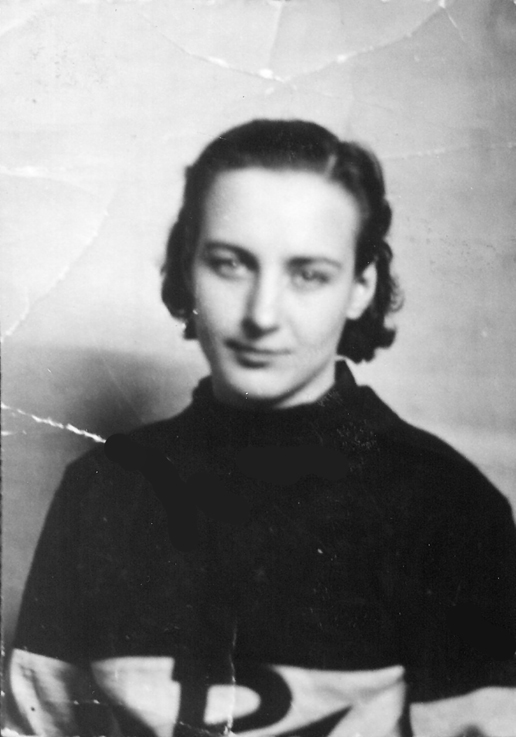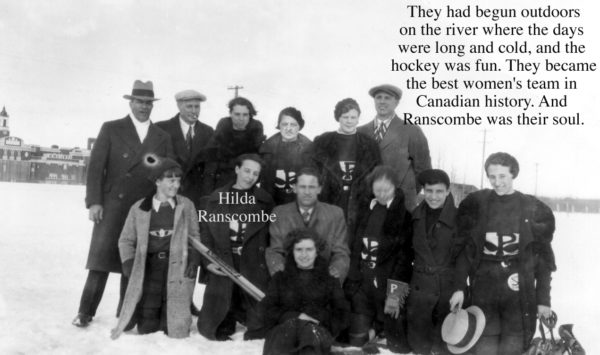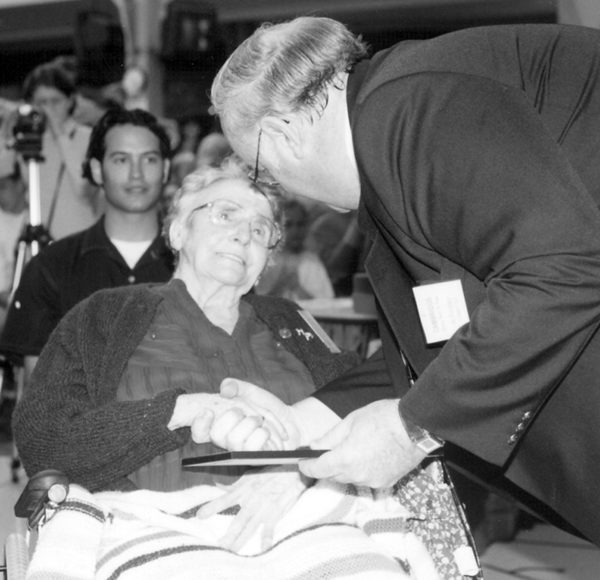September 11, 1913 – August 25, 1999

Simply put, Hilda Ranscombe was regarded in her time as the greatest female hockey player in the world. She might even have been the greatest female hockey player of all time.
Former Olympic gold medalist and later, Globe and Mail sportswriter Bobbie Rosenfeld, who was named Canada’s female athlete of the first half century in a CP poll, regarded Preston’s Ranscombe as one of the game’s greats. In 1938 Rosenfeld, then the Ontario Ladies Hockey president, nominated Ranscombe for the prestigious Norman Craig Memorial trophy as the most outstanding female athlete in Ontario.
Rosenfeld called Ranscombe the “dynamic right winger…whose smooth and swift playing has been an important factor in the envious record of eight champion- ships corralled by the Dominion titlists…We and others who have seen her streak along the ice lanes will readily admit her brilliancy as an individual member of this potent hockey machine.”
Ranscombe’s team, the Preston Rivulettes, were one of the greatest female sports teams in Canadian history, rivaling the Edmonton Grads basketball team. In an estimated 350 games during the decade of the 1930s the Rivulettes lost just three times. “We were supposed to go to Europe to play,” said Ranscombe, “but then the war came and our boat was sunk. We never went.”
With dazzling speed Ranscombe, wrote Rosenfeld, “looks invincible with puck and stick. She has all the equipment for stardom and has really gone places in every hockey contest played. She is an instinctive performer.

In home competition or on foreign ice she is the same natural and gifted player.” For a decade she was the heart and soul of the Rivulettes, wowing fans across the nation. For fun she once scored a goal on Terry Sawchuk by drawing him out of the net during a practice at Galt Arena.
An all-round athlete who played soft- ball and tennis and captured several titles in each, she was, in the estimation of most of her contemporaries, the best ever. Some called the Wayne Gretzky of women’s hockey; others referred to her as the Aurel Joliat or Gordie Howe of her time. She was an outstanding stickhandler and scorer.
No statistics were ever kept to chronicle her scoring feats, and when asked about her hockey abilities, Ranscombe would only say, “The whole team was the most valuable player.”
It was in large part because of her skills that the 1936 Dominion (national) championship was played at the Montreal Forum, the most prestigious match in women’s hockey to date. The Rivulettes won all ten Ontario championships in which they competed and won every Dominion Women’s Hockey Championship with the exception of 1933 when they were beaten by the Edmonton Rustlers in Alberta after a long train ride left them short-handed and sickly. Future NHL president Clarence Campbell was the referee for those two games they lost in Edmonton.
Ranscombe and the Rivulettes owned the decade of the Thirties. When war came the team disbanded and so closed out the most remarkable era of women’s hockey.
Following her induction into the Cambridge Sports Hall of Fame – a ceremony Ranscombe attended in May, 1998, she was posthumously inducted into the World Women’s Hockey Hall of Fame in the Pioneer Player category. At the Hockey Hall of Fame library, there is a book of testimonials and letters by those who not only played with and against her, but also saw her play.

Cambridge’s Taras Zienchuk obtained one of Hilda’s sweaters, socks, pants and gloves so that they could be preserved at the Hockey Hall of Fame, while Hilda’s niece, Betty Barnes, donated another sweater – one of the rarest artifacts in women’s hockey – to the Cambridge Sports Hall of Fame.
Ranscombe was named female athlete of the 20th century by the Cambridge Sports Hall of Fame in 1999.
Make a donation today, and support the Cambridge Sports Hall of Fame.
Cambridge Centre Mall
425 Hespeler RoadUnit #6, PO Box 444 Cambridge, Ontario N1R 8J6
General inquiries: info@cambridgeshf.com Archives and Nominations: cshf1@live.com
© 2025 All Rights Reserved.